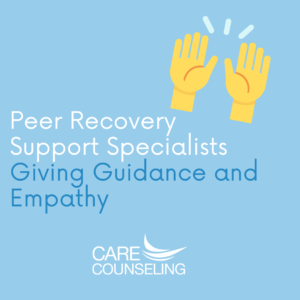Peer Recovery Support Specialists
 Addiction is a battle that often feels isolating and overwhelming. Peer Recovery Support Specialists (PRSS) are individuals who have firsthand experience with addiction and recovery and choose to use their lived experiences to provide invaluable guidance and empathy to others on their recovery journey. Let’s explore the pivotal role of PRSS in addiction treatment and how their unique perspective contributes to a more compassionate and effective recovery process.
Addiction is a battle that often feels isolating and overwhelming. Peer Recovery Support Specialists (PRSS) are individuals who have firsthand experience with addiction and recovery and choose to use their lived experiences to provide invaluable guidance and empathy to others on their recovery journey. Let’s explore the pivotal role of PRSS in addiction treatment and how their unique perspective contributes to a more compassionate and effective recovery process.
The Role of Peer Recovery Support Specialists
Peer Recovery Support Specialists, also known as Peer Support Workers or Peer Mentors, play a multifaceted role in addiction treatment settings. Their primary responsibilities include:
- Offering Understanding and Empathy: PRSS provide a safe and non-judgmental space for individuals in recovery to express their thoughts, fears, and challenges. They understand the struggles firsthand and offer empathy, knowing the emotional turmoil that often accompanies addiction and recovery.
- Building Trust and Rapport: Their shared experiences help build trust and rapport with clients more quickly than traditional healthcare providers might achieve. This foundation of trust is essential for successful treatment.
- Advocating for Recovery: PRSS advocate for clients within the healthcare system, helping them access necessary resources, services, and treatment options. They bridge the gap between clients and the often-complex healthcare landscape.
- Sharing Recovery Tools: PRSS impart practical tools and strategies for managing cravings, triggers, and daily life challenges during recovery. These strategies are rooted in their own experiences and proven to be effective.
- Providing Hope: PRSS offer a beacon of hope for individuals in the early stages of recovery. They serve as living proof that recovery is possible and that a fulfilling, substance-free life awaits.
The Value of Lived Experience
The lived experience of PRSS is at the core of their effectiveness in addiction treatment. Here’s how their personal journey contributes to the recovery process:
- Relatability: PRSS understand the nuances of addiction and recovery better than anyone else. They’ve been through the highs and lows, and this relatability helps individuals in recovery feel understood and less alone.
- Reduced Stigma: Addiction often carries a heavy stigma. PRSS challenge this stigma by demonstrating that addiction can affect anyone, and that recovery is a courageous and achievable path.
- Personal Growth: Many PRSS use their own transformational journey as a source of inspiration. Witnessing someone who has overcome addiction can motivate clients to persevere through their own challenges.
- Resilience: PRSS exemplify resilience, showing that even setbacks and relapses can be part of the recovery process. They emphasize the importance of learning from setbacks rather than giving up.
- Sharing Coping Strategies: PRSS share practical coping strategies based on their own experiences. These strategies are often more relatable and effective than advice from those who haven’t faced addiction personally.
A Holistic Approach to Recovery
PRSS are instrumental in fostering a holistic approach to recovery. They recognize that addiction affects not only the body but also the mind and spirit. By addressing all these aspects, PRSS help individuals build a strong foundation for lasting recovery.
- Emotional Support: PRSS provide a safe space for clients to express their emotions and vulnerabilities. This emotional support is crucial in helping clients process their experiences and develop healthier coping mechanisms.
- Relapse Prevention: PRSS share relapse prevention techniques and offer guidance on how to identify and manage triggers and cravings. Their personal insights can be invaluable in this regard.
- Peer Accountability: The peer relationship between PRSS and clients creates a sense of accountability. Clients are more likely to stay engaged in treatment and remain committed to their recovery goals.
- Role Modeling: PRSS serve as living examples of recovery success. Their ability to maintain sobriety and lead fulfilling lives inspires and motivates clients to do the same.
Challenges and Benefits of Peer Support
While PRSS provide immense benefits, it’s essential to acknowledge the challenges they may face:
- Emotional Toll: Supporting individuals in crisis can be emotionally demanding. PRSS must prioritize self-care to avoid burnout.
- Boundaries: Maintaining appropriate boundaries in the peer relationship can be challenging. PRSS must undergo training to navigate these boundaries effectively.
- Training and Certification: Many states require PRSS to undergo certification and training programs to ensure they are equipped to provide effective support.
Peer Recovery Support Specialists are the heart and soul of addiction treatment, offering hope, empathy, and practical guidance to individuals on their recovery journey. As the field of addiction treatment continues to evolve, recognizing the invaluable contributions of PRSS and integrating their expertise into treatment programs can enhance the overall quality and effectiveness of addiction care. Their lived experiences uniquely qualify them to understand and support those grappling with addiction and mental health challenges.



























